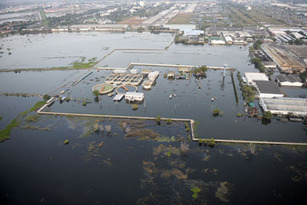 Bangkok floods (Source: UN/Mark Garten) Bangkok floods (Source: UN/Mark Garten) Shuo Zhang Originally published at http://www.rtcc.org/2013/05/27/climate-change-threatens-health-in-the-new-megacities/ Weather was big news in 2012. Australia’s decade-long drought the ‘Big Dry’ ended in May, and the US drought last summer caused a major crop failure. Hurricane Sandy broke records and may well have contributed to a shift in opinion on climate change and possibly helped to swing the election in America. Then Christmas 2012 in the UK was filled with reports of severe flooding, travel delays and damage to property, coming at the end of a year that is the second wettest on record. News stories tend to focus on personal stories, injuries, economic costs and daily inconveniences, but rarely touch upon the impact of these events more broadly on urban systems, and the wider actions that governments need to take to mediate risk and manage impacts on vulnerable populations. In cities in developed countries like the UK, there are contingency plans and reasonable infrastructure for extreme events, but this isn’t the case for all cities. Beyond thinking about discrete climate events, in the developing world, the sheer rate of urbanisation means that poor neighbourhoods in many cities have sprawled onto floodplains and unstable hillsides, which is combined with insufficient infrastructure and services to support health and wellbeing. In many cases, rapid urbanisation has also been both bad for the environment, and for people. Inequality is exacerbated by the unmet demand for housing, services, transport and work. Cities themselves can contribute to ill health and obesity through poor urban planning, inadequate transport provision, pollution and unsafe roads. A lack of or poor regeneration and planning often results in damage to our mental and physical health. The concept of interlinkages between cities, health and climate change has only fairly recently started to come to the fore. When the 2008 UCL/Lancet Commission on the effects of climate change on health was first published, attention was focused on the big uncertainties and risks to health: changing patterns of infectious disease, and indirect impacts of famine, political instability and migration. Although excess deaths due to heatwaves were identified, there was little discussion of the particular vulnerabilities of people in informal settlements. Since then, droughts, storms and floods have also shown the potential for climate change to take us by surprise, and that greater effort and funding for mitigation and adaptation are needed now. Megacities at risk There is increasing urgency to focus our attentions on cities, and it is predicted that the livelihoods of hundreds of millions of people living in cities will be affected by climate change over the next 5-10 years. The humanitarian imperative isn’t the only one: we must also remember that the most vulnerable have in general contributed least to atmospheric greenhouse gases. According to a UNFPA report, half of Africa’s 37 ‘million cities’ are at risk from sea-level rise and storm surges. Many Asian cities are in the floodplains of major rivers such as the Ganges, Mekong and the Yangtze. Climate change will have complex impacts on cities, and is exposing vulnerabilities in the social, economic and political fabric of our communities. The longer we wait, the more it will cost – not just in GDP as outlined by the Stern Review but in health, and in lives. We can’t just go on with business as usual. It’s not all bad news – urban environments can also allow new forms of social organisation to lead the way and offer new solutions. Cities can offer a possibility for decoupling high standards of living from high carbon footprints, and a small effort may lead to big change because of their centralised nature – for example in improving roads for pedestrians and cyclists to use. There is a range of ways to change policy and in turn change physical realities. Karachi’s Urban Resource Centre – an organisation founded by teachers, professionals, students, activists and community groups from low-income settlements – has successfully challenged government plans, showing that community action can make a difference to those living closest to the edge. For the first time in history, half the world now lives in cities, and this number is set to continue growing. We need a concerted effort to improve our global cities by putting systems in place to facilitate environmentally sustainable and healthy lives and ensuring that they are adapted to climate risk and able to protect the most vulnerable.
0 Comments
Your comment will be posted after it is approved.
Leave a Reply. |
Details
Archives
February 2019
Tags
All
|
 RSS Feed
RSS Feed
